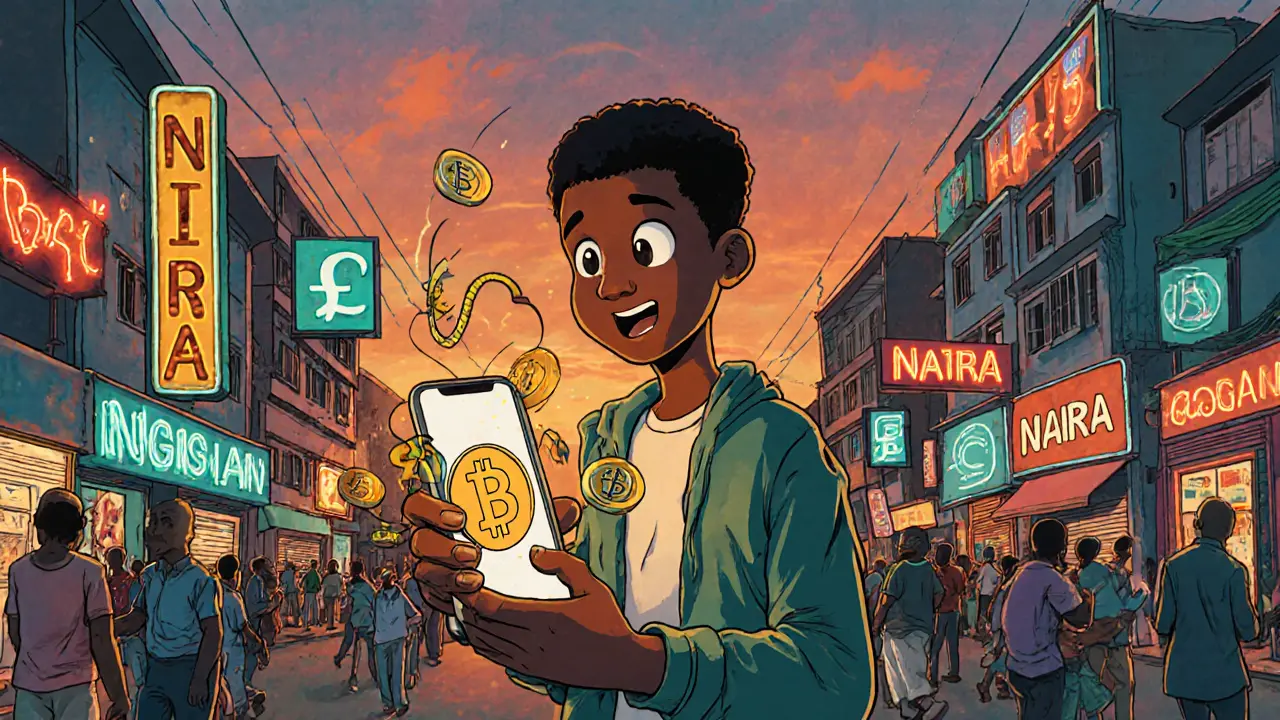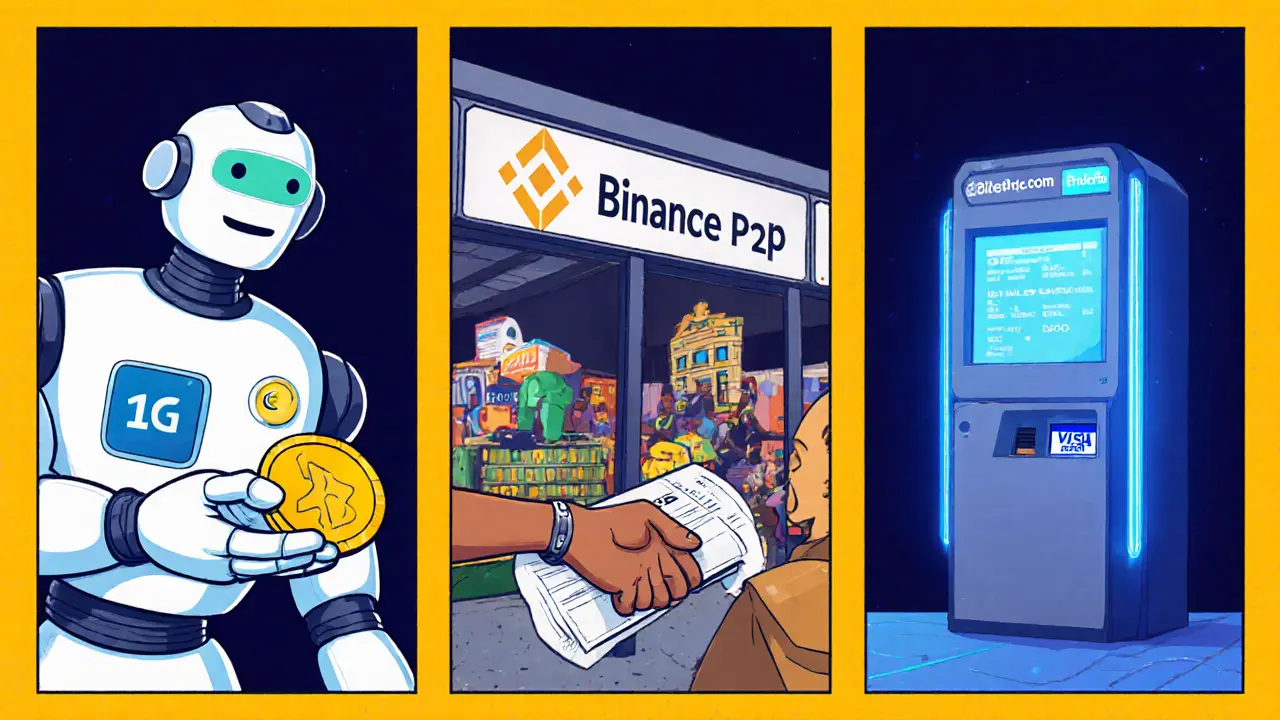How to Buy Crypto with Fiat in Nigeria (2025 Guide)

Oct, 13 2025
Crypto Fee Calculator for Nigeria
Calculate your crypto purchase in Nigeria using the most common platforms. Enter your Naira amount and see how much cryptocurrency you'd receive after platform fees.
If you’re a Nigerian looking to turn your Naira into Bitcoin, Ethereum, or any other digital asset, the process looks a lot simpler today than it did a few years ago. Below you’ll find a step‑by‑step roadmap, platform comparisons, and safety tips that let you buy crypto Nigeria without getting tangled in regulatory red tape.
What "crypto buying with fiat" really means in Nigeria
Cryptocurrency purchase with fiat in Nigeria is a process where users exchange Nigerian Naira (NGN) for digital tokens like Bitcoin or Ethereum through online platforms that accept local payment methods. The Central Bank of Nigeria (CBN) clamped down on direct bank‑to‑exchange links in 2021, but a mix of crypto brokers, exchange platforms and peer‑to‑peer (P2P) marketplaces keep the market humming.
Three‑step framework that works everywhere
- Pick a wallet. A secure place to store your coins-mobile apps like Trust Wallet, hardware devices like Ledger, or custodial wallets offered by brokers.
- Select a buying platform. Choose a broker, exchange, or P2P site that supports NGN.
- Complete KYC and payment. Verify your identity, fund the account, and confirm the trade.
Follow these steps and you’ll be able to purchase crypto on almost any platform listed later.
Platform categories: broker, exchange, or P2P?
Each category solves the same problem-turning fiat into crypto-but they differ in user experience, fees, and regulatory exposure.
| Platform | Type | NGN support | Common payment methods | Typical fees | KYC level |
|---|---|---|---|---|---|
| Luno | Broker | Yes | Bank transfer, debit/credit card | 0.5‑2% | Basic ID + selfie |
| Binance P2P | P2P Marketplace | Yes | Bank transfer, PayPal, cash | 0% (platform fee), spread varies | Full ID + proof of address |
| Blockchain.com | Broker/Exchange hybrid | Yes (since Mar 2025) | Visa/Mastercard, bank transfer | 1‑1.5% | Basic ID for $150+ trades |
| Changelly | Exchange aggregator | Via partner providers | Card, Apple/Google Pay, PayPal | 0.5‑1.5% + provider markup | Depends on provider (usually full ID) |
Pick the category that matches your comfort level: brokers for simplicity, exchanges for trading tools, or P2P for the best rates.

Top platforms for Nigerian users
- Luno a crypto broker that accepts direct NGN deposits via local banks and cards. Sign‑up, verify with a national ID, and you can buy Bitcoin or Ethereum in just a few clicks. Fees hover around 1.5% for bank transfers.
- Blockchain.com a global platform that launched native NGN support in March 2025. After a quick KYC, you can deposit Naira directly and trade a handful of major coins instantly.
- Binance P2P the peer‑to‑peer marketplace of the world’s largest crypto exchange. Sellers list NGN prices, you pay via bank transfer, and the escrow releases the crypto once payment is confirmed.
- Changelly an aggregator that connects you to vetted providers offering NGN‑linked offers. The five‑step flow (choose pair, pick offer, pay, confirm, receive) works on mobile or desktop.
- LocalBitcoins a classic P2P site where Nigerian users post ads to buy or sell crypto. It uses an escrow system similar to Binance P2P but has a larger community of local traders.
Most Nigerians keep accounts on two or three of these platforms. That way, if a regulator clamps down on one, you still have a fallback.
Payment methods you can actually use
Because banks can’t officially process crypto trades, platforms rely on a mix of legacy and newer routes:
- Bank transfers. Direct NGN transfers to a platform’s partnered bank account. Usually the cheapest (0‑0.5% fee) but can take 1-2 business days.
- Debit/credit cards. Visa and Mastercard work on most brokers. Expect higher fees (2‑3%) and occasional declines due to bank restrictions.
- Mobile money. Services like Paga and Opay are increasingly accepted on P2P sites.
- International cards & PayPal. Used on Changelly and other aggregators for faster processing, though conversion fees apply.
Always double‑check the platform’s “Accepted payment methods” page before starting a trade; the list can change after regulatory updates.
Regulatory reality check
The Central Bank of Nigeria (CBN) the nation’s monetary authority that banned banks from facilitating crypto transactions in 2021. The ban does not criminalize ownership, but it forces platforms to use work‑arounds like escrow‑based P2P or offshore payment processors.
Key compliance tips:
- Never share your bank login details with anyone claiming to be a “crypto broker”.
- Complete KYC on the platform itself, not on a third‑party “agent”.
- Keep a small amount of crypto on a non‑custodial wallet for emergencies.
- Monitor local news; CBN occasionally issues advisories that affect which payment methods stay online.

Common pitfalls and how to avoid them
- Choosing a platform that suddenly blocks NGN. Mitigation: maintain accounts on at least two platforms, and withdraw to a personal wallet weekly.
- Ignoring KYC delays. Mitigation: upload clear, high‑resolution ID photos and a utility bill; most platforms verify within minutes if the documents are legible.
- Paying high conversion fees. Mitigation: use a broker with native NGN support (e.g., Luno, Blockchain.com) instead of converting USD→NGN on a separate step.
- Falling for escrow scams. Mitigation: only trade on sites that hold the crypto in escrow until the seller’s bank confirms receipt (Binance P2P, LocalBitcoins, Bybit P2P).
Quick cheat‑sheet for buying crypto in Nigeria
- Set up a secure wallet (Trust Wallet or Ledger).
- Open accounts on Luno and Binance P2P (or Blockchain.com if you like a single‑click flow).
- Complete basic KYC (ID + selfie).
- Fund via bank transfer for the lowest fees.
- Buy Bitcoin or Ethereum, then move a portion to your personal wallet.
- Keep an eye on CBN announcements and adjust payment methods if needed.
Frequently Asked Questions
Can I buy crypto directly with Naira in 2025?
Yes. Platforms like Luno, Blockchain.com and Binance P2P let you deposit NGN straight into your account and trade instantly. The key is to choose a service that still lists NGN as a supported fiat.
Do I need a Nigerian bank account?
For the cheapest route, yes-bank transfers are the lowest‑fee method. However, you can also use Visa/Mastercard or mobile‑money wallets if your bank blocks crypto‑related transfers.
Is crypto ownership illegal in Nigeria?
No. The CBN only restricts banks from processing crypto transactions. Individuals can legally hold and transfer crypto, but they must use compliant platforms.
What’s the safest way to store my newly bought coins?
Move them to a non‑custodial wallet you control. Hardware wallets offer the best security; mobile wallets are convenient for small amounts.
How do I avoid KYC delays?
Upload clear copies of a government‑issued ID and a recent utility bill. Most platforms verify within minutes if the documents are legible and match the name on your account.